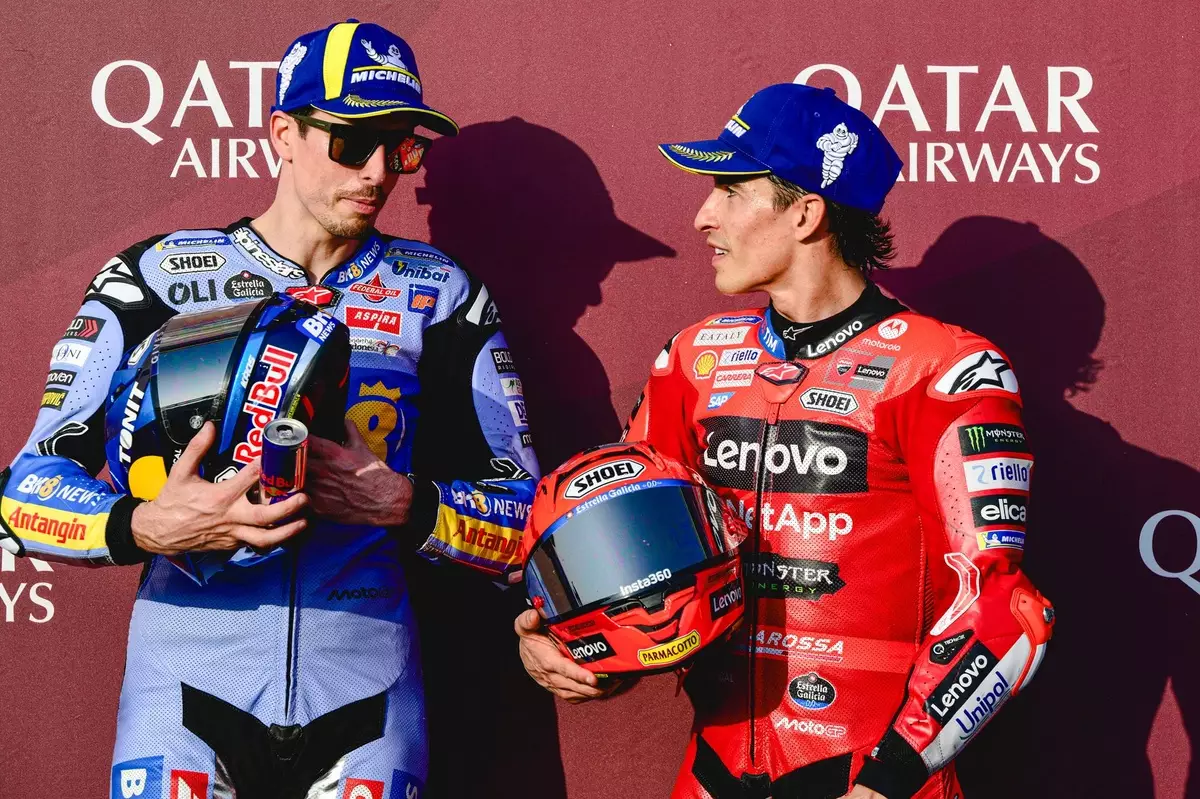The Qatar Grand Prix showcased not only the fierce competition within MotoGP but also the intricate dynamics of sibling rivalry, exemplified through the incident involving champions Marc and Alex Marquez. This race was a stark reminder of how quickly adrenaline and competitive spirit can turn into misjudgments, especially at the elite level of motorsports. As Marc, the elder Marquez and distinguished poleman, collided with younger brother Alex under circumstances that many might deem unfortunate, the implications reached beyond mere points on a scoreboard; they rifled through the familial bond that oftentimes extends into the competitive arena.
Taking charge of this narrative, Marc openly accepted his share of the blame for the first-corner incident during the chaotic opening moments of the race. As Marc powered his bike into the first corner at a pace that surprised both him and his brother, the ensuing contact sent shockwaves that rippled through the rest of the race. The dynamics of racing are such that speed is a constant variable, yet the moment when Marc shut the throttle, feeling a sudden slide from the rear of his Ducati, became the focal point of disappointment for not just him, but also for Alex, who found himself conceding an early lead to Franco Morbidelli.
The Weight of Responsibility
In races, particularly at MotoGP’s level, collisions are not just accidents; they are complex webs of decisions, timing, and split-second adjustments formed by the riders’ levels of proficiency. Marc’s reflection post-race carried a weight of genuineness as he expressed remorse while narrating the incident. “It was more a little bit my mistake,” he said, an acknowledgment that reflects the mental burden racers carry when they collide with personal and professional expectations. Interestingly, one can argue that this acceptance of responsibility is a hallmark of a true champion. The willingness to own up to mistakes speaks to character—something that transcends mere sportsmanship.
Equally noteworthy was the response from Alex, who held himself accountable for a separate incident involving Fabio di Giannantonio. After attempting to reclaim his position in an aggressive maneuver, Alex found himself amid a reckless situation that left observers questioning his decision-making under pressure. “I accept it,” he remarked regarding the crash, illustrating the humility required for growth even amidst disappointment. Yet, Alex’s struggle during the race revealed an underlying frustration; competing under the shadow of a more experienced brother often intertwines with the pressure to perform side by side with this familial legacy.
The Price of Mistakes
In high-stakes situations like this, where split-second decisions can result in significant ramifications, one must consider the impact on racing careers. For Alex, who began the race trailing Marc by merely two points, the incident not only cost him precious finishing positions but also widened the gap to 17 points in the standings, a tangible representation of how setbacks can quickly accumulate. The psychological toll of racing against a sibling—as opposed to a regular competitor—adds layers of complexity, making accountability not just a personal affair but a shared family dialogue.
Moreover, Fabio di Giannantonio’s reflections on the matter serve as a reminder of the broader implications beyond just winning or losing. His frustrations shed light on the communal responsibility that all riders share regarding safety on the track. “At MotoGP world championship level, we must avoid this kind of situation,” he stated, advocating for the sanctity of racing sport. The expectation of precision and control at this level often overlooks the human element, wherein emotion and instinct can lead even the best off-course.
A Call for Self-Reflection
Ultimately, the Marquez brothers’ experience at the Qatar Grand Prix is a poignant reminder of the unpredictable nature of racing, especially when blended with personal stakes. As fans and observers, we may celebrate victories and lament losses, yet amid the exhilarating chaos, there lies profound life lessons about personal accountability and the ripple effects of our decisions. With titles often hanging by delicate threads, it is the moments of humility and reflection that provide the grounding necessary for growth both on and off the track.
In a sport where split-second decisions dictate outcomes, the Marquez brothers remind us of the intricate balance between ambition, family, and responsibility—elements that make MotoGP not just a race but a canvas of life lessons waiting to be learned.

